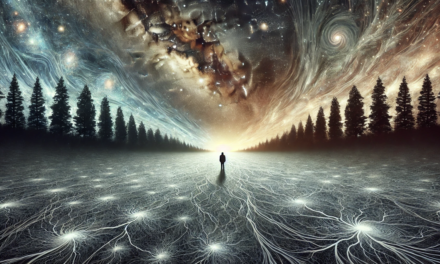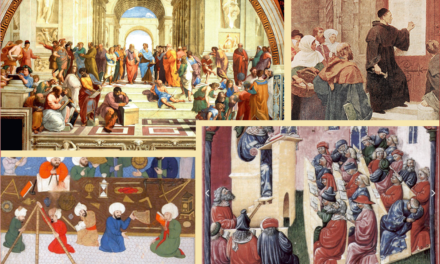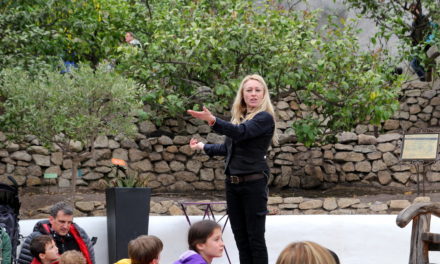Reflections on the Biblical and Biological accounts of the creation of the world.
Two different accounts of creation
The four lectionary readings set for the Second Sunday before Lent this year (2009), which happened to fall on 15th February, were all about the creation of the world. For convenience, they are printed out in an appendix to this paper. By coincidence, this was the nearest Sunday to the 200th anniversary of the birth on 12th February of Charles Darwin, whose theories of evolution have given rise to quite a different account of creation to that contained in the Bible.
The discrepancies between these two accounts cause difficulties for many Christians, no matter what their denomination. They inevitably raise questions such as, “How are we to respond to these two very different accounts?” Or, “Just what ARE the differences between the two accounts? Do we have to choose between them? Can they be reconciled?”
This paper arises from a sermon preached at the United Reformed Church in Hythe on the date in question, and its purpose is to help the reader to understand just what the differences are between the two different accounts, using the four set readings as a lens through which to view the Biblical account. Its structure will be similar to that of the sermon, namely:
- To compare and contrast two different ways of knowing;
- To examine the topic of the creation of the world through two different lenses:
- What science has to say about creation, and
- What the Bible has to say about creation.
- And finally to consider what God might be seeking to say to worshipping Christians through the side-by-side existence of these two accounts.
Different ways of knowing
Both science and faith are seeking truth, but doing so in very different ways. Science, on the one hand, examines the material world and asks questions such as, “How does it work? What does it use this thing for? What causes this or that to happen?” Religious faith, on the other hand, examines the non-material world, and asks questions such as, “What is the purpose of creation? How can we live in harmony with the Universe and its creator? How should we behave under these or those circumstances?”
To take a practical example, think of someone you know and love – let’s call her Aunt Bess. Science can provide you with facts about her physical make-up: her DNA, the chemical balance of her blood, her height and weight and so on. This is, of course, very useful to help doctors determine whether or not Aunt Bess needs medication for high blood pressure. But assuming you have answered everything that there is to know in this way, will you really “know” Aunt Bess?
Most of us would answer, “Of course not.” To know Aunt Bess, you have to know who she is. You need to experience her in a relationship. You need to take account of many non-material factors, as well as the material ones.
Behind both ways of knowing lies the same reality – the person that you know as Aunt Bess. But each gives a different account of her.
The role of theory
The basis to scientific method is “empirical observation” – observing what happens under what certain circumstances, and making careful note of precisely what is observed. These observations are often carried out in the form of controlled scientific experiments – just think of the experiments that were planned for the end of last year using the Large Hadron Collider at Cern in Geneva. Indeed, the popular image of a “scientist” is of someone who carries out experiments in order to find things out.
But science is much more than empirical observation and carrying out experiments. Sitting behind these experiments are “theories” – explanations of why things behave as they do. Indeed, all knowledge needs “theories”. That’s one thing that science and faith have in common with each other and with all other truth-seeking activities such as history, social science, mathematics or philosophy. In our everyday example, for example, some “theory” about the circumstances in which Aunt Bess was brought up, might help to explain some of her behaviour that otherwise might not make any kind of sense.
Another characteristic shared by all kinds of knowledge is that they are provisional and open to further enlightenment. If we keep seeking for truth, we are always in danger of learning something new!! But that isn’t always comfortable, and so a question we can all ask ourselves is, “What do we do with these new things that we lean?” How do we live with new ideas, especially ones that challenge what we have hitherto “known for a fact”? How do we make room for these new ideas in our lives?
Our mental furniture
When we talk about “making room” for new ideas, of course, we are using the metaphor of furnishing our minds, rather like we furnish our homes. So perhaps it will be instructive to pursue that metaphor a little further.
What do we do, for example, when we see a new piece of furniture that we like? Or perhaps a new piece of equipment for the home? Isn’t our first challenge to decide where we might put it? Whether or not we have room for it, perhaps? Or whether we have to make room for it by getting rid of something else?
In order to live in comfort, we need different kinds of places in our homes. Places to relax, to eat, to keep and prepare food, to sleep, to worship and so on. Most of us set aside different rooms, or different parts of rooms, to do the different things in. We don’t sleep in the kitchen, and we don’t (often) cook our food in the bedroom. We have different pieces of furniture to help us do these different things.
It isn’t all hard and fast, of course. Some people relax by cooking, and so their kitchen is both for work and for relaxation. Some of us like to read in the lounge – others in bed.
Science and faith are ways of knowing that are as different from each other as cooking is from sleeping. Each of them needs different kinds of “mental furniture”. And each of us furnishes our mental homes as differently as we furnish our actual physical homes. No matter what anybody claims, each of us has chosen our own mental furniture – everybody lives somewhere.
So we can now turn our attention to two very different accounts of the creation of the universe, as it appears to people living in very different mental environments: the biological account given by scientists, and the account given by the authors of the bible.
The biological account of creation.
Science is a highly successful way of finding out how things work. As we have seen scientists use theory to design experiments, and by observing the results of the experiments they gather evidence that confirms, modifies or disproves the theory. Scientific theory, therefore, is central to the effective practice of science.
There are many theories in science: big bang theory, quantum theory, the theory of relativity – the list is extensive. The value of any of these theories is the accuracy with which it predicts what results will be obtained when experiments are carried out. A good theory is one that explains a great deal very simply.
Judged by that criterion, Darwin’s theory is one of the best scientific theories of all time. When he first published it, 150 years ago, there were many elements of his theory for which he couldn’t provide evidence. Nevertheless, he set out his argument in detail, admitted the gaps in evidence and the difficulties that he could see with the theory.
In essence, the theory is very simple. It has just two ideas at its heart: variation, and selection.
Variation first. Whenever copies are made of anything, some of the copies will be imperfect reproductions of the original. This is true of anything, animate or inanimate: photocopies, TV pictures, Chinese whispers, DNA, photographs – anything. That’s it. That’s’ all that variation says.
Now selection. Processes of selection work on these copies so that some are preserved and others aren’t. Human beings, for example, reject faulty copies that emerge from the manufacturing processes. Or perhaps they do the opposite, and select particular plants or young animals in pursuit of award-winning perfection or the development of a new breed. But aside from this deliberate form of selection, well-known to farmers, dog-breeders and plantsmen for centuries, two other forms are woven into the fabric of life as we know it.
Natural selection occurs when some of the copies turn out to be better suited to their environment than others, and so have a better chance to live longer and reproduce. It’s not a matter of being strongest or most violent, but rather of being better adapted to whatever circumstances prevail during their lifetime.
The second, sexual selection, applies to all those forms of life that produce copies of themselves (eggs, offspring or children) through sexual reproduction. Well-adapted specimens that live long enough to reproduce, clearly have an advantage over their less fortunate relatives. But even among those that make it to puberty, not every specimen is fortunate enough to find a mate. And the competition for mates leads inevitably to improved chances of survival for those fortunate’s who possess the qualities to persuade their paramour to join them in the act of procreation.
That is Darwin’s theory in a nutshell: variation means that not every copy is the same, and selection acts to favour some copies over others. Simple and elegant.
In the past 150 years, science has discovered a lot, and all of it supports Darwin’s theory. Genetics, medical science, ecology have all contributed evidence. As one of the scientists at the Natural History museum remarked when a group of us from Radnor Park Church went on a “behind the scenes” tour, “Nothing in biology makes sense except in the light of evolution.”
So why is it that this simple and elegant theory, well-known in practice for centuries and massively supported by evidence from numerous fields, with more being discovered each day, causes such problems for so many Christians?
The problems start as soon as we reach the account of how human life evolved from other forms of life. Most religions also offer their own accounts or stories of how this happened, such as the stories in the book of Genesis, for example, and these accounts can sometimes be treated as if they were central tenets of the religion. Unfortunately, many of the most vocal proponents of Darwin’s theory are aggressively atheist (of which more will be written shortly), and that tends to set up equal and opposite reactions among their religious opponents.
Even people who are fairly open-minded and can understand how plants and animals can change a bit through evolution sometimes draw the line at the kind of changes that turn an earthworm into a human being!
Now, most changes are indeed small, so to understand how Darwin’s theory accounts for the evolution of human beings, we need to understand just how vast the extent is of geological time – what scientists call “deep time”. Quite independently of Darwinian biologists, cosmologists agree that the age of the known Universe is approximately 13.7 billion years, and the age of the earth approximately 4.5 billion years. That is quite long enough for change on the scale needed for single-celled creatures top evolve into the richness of life that we see all around us today. Time enough to allow the evolution of organs as intricate and wonderful as the human eye. Indeed, genetic science today traces all life back to its origins in a single-celled creature, demonstrating that all life on earth is truly related. The tree of life links us to all living creation, as well as to every creature that has ever lived.
But if the universe and even the earth have been around for a very long time, humankind hasn’t. It is very difficult for us to grasp the length of 13.7 billion years, so a more homely analogy is in order. Suppose that we were to represent all the time from the creation of the universe to the present day as a single year, then we human beings have been around for the last minute and a half of the last day of the year. Farming has been around for perhaps the last 30 seconds, while the time from Abraham to now is the last ten seconds of it.
Although we haven’t been around for long, we have made our mark in no uncertain manner. At the start of the last 30 seconds, when farming began, humankind, its pets and all its livestock amounted to less than one tenth of one percent of all vertebrate life on earth. Today, in contrast, just that brief time later, we, our pets and our livestock account for a whopping 98% of all vertebrate life on earth. This is one of the reasons that scientists are now so willing to discuss issues such as climate change and global warming.
One such issue that is hitting the headlines today, is the topic of stem cell research. Biological research designed to isolate general purpose cells that can then be persuaded to heal diseased parts of the human body. However, even people who are not inherently religious are beginning to say that just because scientists CAN do something, doesn’t mean to say that they SHOULD do that thing. And scientific knowledge turns out to be of no help to us at all in answering what we SHOULD do. For that we need a different kind of knowledge – one known in both the Bible and in ancient Greek philosophy as “wisdom”.
And for wisdom, we have to move out of one room in our mental environment, and into quite a different one. One which contains, for example, the reading from Proverbs in the Appendix to this paper.
The Biblical account of creation
The Old Testament has the meaning of creation right at its heart. Not just in the book of Genesis – it runs right through the whole collection of books like the lettering through a stick of seaside rock. To say that God is “creator” and to use the verb “create” is to say two things: firstly that God and the world are different from each other, and secondly that the two of them are intensely linked in a relationship of fidelity.
We now know that the Old Testament used and adapted other ancient Near Eastern creation myths, but they were rewritten in the light of Israel’s own faith. Whereas the original material showed God (or gods) arbitrarily exercising their power, for Israel God uses His power to generate a fruitful, life-sustaining system that calls for a glad response of obedient praise.
On the one hand God will not act arbitrarily, whilst on the other the world is not autonomous, going its own independent way. That s the point behind the reading from Psalm 104. The reading from Proverbs shows just how deeply the Old Testament view of creation permeates even the practical advice contained within the Book of Proverbs. Reason is not reasonable by chance, but because that is the way God designed it. This is the theory that underpins the whole of Israel’s faith, as expressed in the Old Testament.
But ideas evolve and change, even in the Bible, and the first Christians were presented with a whole lot of fresh evidence. The teaching of Jesus, confirmed by the evidence of the resurrection, opened their eyes to new insights into the nature of God. The breathtaking innovation that they made was to say that this one through whom all creation was made, was none other than Jesus. Paul states this explicitly in the reading from Colossians, and John does the same right at the beginning of his Gospel.
But what Paul and John are each affirming is a new twist on the same point that is central to the Old Testament account of creation: the same God who created the world is the God of the covenant; redeeming and sustaining the world. And just as scientists can say, “Nothing in Biology makes sense except in the light of evolution”, so many Christians can affirm with Paul and with John, “Nothing in the field of human relationships makes sense except in the light of God’s compassionate love as revealed by Jesus.”
So what are we, as worshipping Christians, to make of these two very different accounts. Two very different accounts of creation. Can we live with both of them? Or do we have to decide?
Seeking truth.
In the world of science, we are beginning to understand more about human beings as tribal animals. And although our ability to live in much larger groups than our nearest relatives, the primates, brings with it many advantages that have allowed our species to prosper in the world, it also brings with it some very unfortunate behavioural tendencies.
It is unfortunate indeed that as Darwinism itself evolves, it is giving rise to a new breed of evangelical atheists, seeking to win converts for their particular brand of humanistic atheism, and claiming justification for it in the theory of Charles Darwin. The recent advertising campaign on London buses is a good example: “There is probably no God. Now stop worrying and enjoy your life.”
One of the key complaints of such people is that religion is responsible for fanaticism, a major cause of unrest and violence in the world. But they themselves are doing precisely what they complain about, and by stoking the fires of conflict, they themselves are adding fuel to the fire. Not just on the buses, but through a wave of inflammatory books. Richard Dawkins, Daniel Dennet, Michael Schermer, Sam Harris. The list of authors is a long one.
This is precisely the point where the Biblical account, particularly in the New Testament, provides us with the guidance we need. We must avoid falling into the tribalism trap. Darwinism is no more to be equated with atheism than the Bible is to be equated with the Inquisition or the Crusades, or the Qur’an with Al Qaida. And people are to be loved and held compassionately in the face of God, not condemned and cast out.
Many atheists are convinced that the scientific method is the cornerstone of all human knowledge. But we should be wary of granting any special status to the notion that scientific knowledge is somehow more valid than any other form of knowing. It is a valid form of knowledge, but not the only one, nor the most important one.
Earlier in this article, we considered how people create different mental environments by carefully choosing their mental furniture. Atheists, Christians, Buddhists, Moslems and many others all furnish their environments very differently, perhaps naturally, given the tribal nature of our species. But we know full well from the life and teaching of Jesus that God’s loving design is to invite us to work with Him to renew all of creation in His loving care.
So when we talk to others who furnish their environments differently, we should remember that it is not possible to conduct a discussion from nowhere. Yet there is only one reality, and so all of our differences arise from partial, incomplete or mistaken understanding of that reality. And this means that we can approach the truth only through talking to those who furnish their mental environments differently from us. We can only converse with them either by inviting them into our own environment, or by joining them in theirs – and that calls for hospitality.
During his earthly life, Jesus showed us the importance f hospitality and table fellowship with those who are very different. David Ford, the Regius Professor of Divinity at Cambridge University has said that the only way to talk to people of different faiths is through what he calls “hospitable dialogue”. And in hospitality, we all know that different rules apply to the differences between people.
It isn’t alternative ways of thinking about the world that are the enemy to discerning the truth, it is bigotry and indifference to the truth.
Later in Paul’s letter to the church at Colossae than the reading set for today, he writes, “ You have clothed yourselves with the new self, which is being renewed in knowledge according to the image of its creator. In that renewal there is no longer Greek and Jew, circumcised and uncircumcised, barbarian, Scythian, slave and free; but Christ is all and in all!” Had he been writing today, he may well have added, “There are no longer scientists and people of faith.”
And the words he writes soon after this are perhaps our best guide, as we seek Truth together with our fellow seekers of other faiths. “And let the peace of Christ rule in your hearts, to which indeed you were called in the one body. And be thankful. Let the word of Christ dwell in you richly; teach and admonish one another in all wisdom; and with gratitude in your hearts sing psalms, hymns, and spiritual songs to God. And whatever you do, in word or deed, do everything in the name of the Lord Jesus, giving thanks to God the Father through him.”





